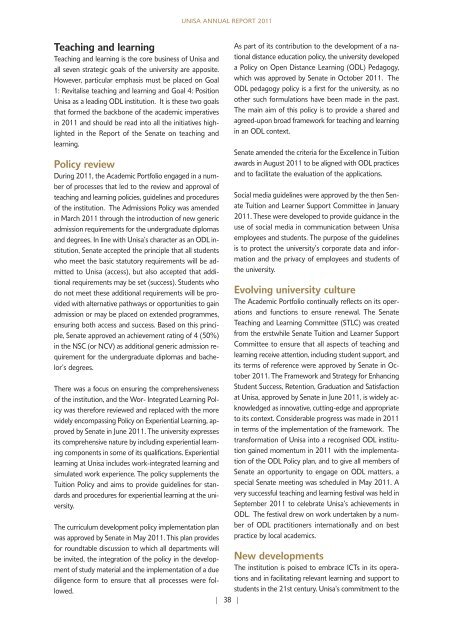Download the Annual report 2011 - Unisa
Download the Annual report 2011 - Unisa
Download the Annual report 2011 - Unisa
You also want an ePaper? Increase the reach of your titles
YUMPU automatically turns print PDFs into web optimized ePapers that Google loves.
Teaching and learning<br />
Teaching and learning is <strong>the</strong> core business of <strong>Unisa</strong> and<br />
all seven strategic goals of <strong>the</strong> university are apposite.<br />
However, particular emphasis must be placed on Goal<br />
1: Revitalise teaching and learning and Goal 4: Position<br />
<strong>Unisa</strong> as a leading ODL institution. It is <strong>the</strong>se two goals<br />
that formed <strong>the</strong> backbone of <strong>the</strong> academic imperatives<br />
in <strong>2011</strong> and should be read into all <strong>the</strong> initiatives highlighted<br />
in <strong>the</strong> Report of <strong>the</strong> Senate on teaching and<br />
learning.<br />
Policy review<br />
During <strong>2011</strong>, <strong>the</strong> Academic Portfolio engaged in a number<br />
of processes that led to <strong>the</strong> review and approval of<br />
teaching and learning policies, guidelines and procedures<br />
of <strong>the</strong> institution. The Admissions Policy was amended<br />
in March <strong>2011</strong> through <strong>the</strong> introduction of new generic<br />
admission requirements for <strong>the</strong> undergraduate diplomas<br />
and degrees. In line with <strong>Unisa</strong>’s character as an ODL institution,<br />
Senate accepted <strong>the</strong> principle that all students<br />
who meet <strong>the</strong> basic statutory requirements will be admitted<br />
to <strong>Unisa</strong> (access), but also accepted that additional<br />
requirements may be set (success). Students who<br />
do not meet <strong>the</strong>se additional requirements will be provided<br />
with alternative pathways or opportunities to gain<br />
admission or may be placed on extended programmes,<br />
ensuring both access and success. Based on this principle,<br />
Senate approved an achievement rating of 4 (50%)<br />
in <strong>the</strong> NSC (or NCV) as additional generic admission requirement<br />
for <strong>the</strong> undergraduate diplomas and bachelor’s<br />
degrees.<br />
There was a focus on ensuring <strong>the</strong> comprehensiveness<br />
of <strong>the</strong> institution, and <strong>the</strong> Wor- Integrated Learning Policy<br />
was <strong>the</strong>refore reviewed and replaced with <strong>the</strong> more<br />
widely encompassing Policy on Experiential Learning, approved<br />
by Senate in June <strong>2011</strong>. The university expresses<br />
its comprehensive nature by including experiential learning<br />
components in some of its qualifications. Experiential<br />
learning at <strong>Unisa</strong> includes work-integrated learning and<br />
simulated work experience. The policy supplements <strong>the</strong><br />
Tuition Policy and aims to provide guidelines for standards<br />
and procedures for experiential learning at <strong>the</strong> university.<br />
The curriculum development policy implementation plan<br />
was approved by Senate in May <strong>2011</strong>. This plan provides<br />
for roundtable discussion to which all departments will<br />
be invited, <strong>the</strong> integration of <strong>the</strong> policy in <strong>the</strong> development<br />
of study material and <strong>the</strong> implementation of a due<br />
diligence form to ensure that all processes were followed.<br />
UNISA ANNUAL REPORT <strong>2011</strong><br />
| 38 |<br />
As part of its contribution to <strong>the</strong> development of a national<br />
distance education policy, <strong>the</strong> university developed<br />
a Policy on Open Distance Learning (ODL) Pedagogy,<br />
which was approved by Senate in October <strong>2011</strong>. The<br />
ODL pedagogy policy is a first for <strong>the</strong> university, as no<br />
o<strong>the</strong>r such formulations have been made in <strong>the</strong> past.<br />
The main aim of this policy is to provide a shared and<br />
agreed-upon broad framework for teaching and learning<br />
in an ODL context.<br />
Senate amended <strong>the</strong> criteria for <strong>the</strong> Excellence in Tuition<br />
awards in August <strong>2011</strong> to be aligned with ODL practices<br />
and to facilitate <strong>the</strong> evaluation of <strong>the</strong> applications.<br />
Social media guidelines were approved by <strong>the</strong> <strong>the</strong>n Senate<br />
Tuition and Learner Support Committee in January<br />
<strong>2011</strong>. These were developed to provide guidance in <strong>the</strong><br />
use of social media in communication between <strong>Unisa</strong><br />
employees and students. The purpose of <strong>the</strong> guidelines<br />
is to protect <strong>the</strong> university’s corporate data and information<br />
and <strong>the</strong> privacy of employees and students of<br />
<strong>the</strong> university.<br />
Evolving university culture<br />
The Academic Portfolio continually reflects on its operations<br />
and functions to ensure renewal. The Senate<br />
Teaching and Learning Committee (STLC) was created<br />
from <strong>the</strong> erstwhile Senate Tuition and Learner Support<br />
Committee to ensure that all aspects of teaching and<br />
learning receive attention, including student support, and<br />
its terms of reference were approved by Senate in October<br />
<strong>2011</strong>. The Framework and Strategy for Enhancing<br />
Student Success, Retention, Graduation and Satisfaction<br />
at <strong>Unisa</strong>, approved by Senate in June <strong>2011</strong>, is widely acknowledged<br />
as innovative, cutting-edge and appropriate<br />
to its context. Considerable progress was made in <strong>2011</strong><br />
in terms of <strong>the</strong> implementation of <strong>the</strong> framework. The<br />
transformation of <strong>Unisa</strong> into a recognised ODL institution<br />
gained momentum in <strong>2011</strong> with <strong>the</strong> implementation<br />
of <strong>the</strong> ODL Policy plan, and to give all members of<br />
Senate an opportunity to engage on ODL matters, a<br />
special Senate meeting was scheduled in May <strong>2011</strong>. A<br />
very successful teaching and learning festival was held in<br />
September <strong>2011</strong> to celebrate <strong>Unisa</strong>’s achievements in<br />
ODL. The festival drew on work undertaken by a number<br />
of ODL practitioners internationally and on best<br />
practice by local academics.<br />
New developments<br />
The institution is poised to embrace ICTs in its operations<br />
and in facilitating relevant learning and support to<br />
students in <strong>the</strong> 21st century. <strong>Unisa</strong>’s commitment to <strong>the</strong>

















